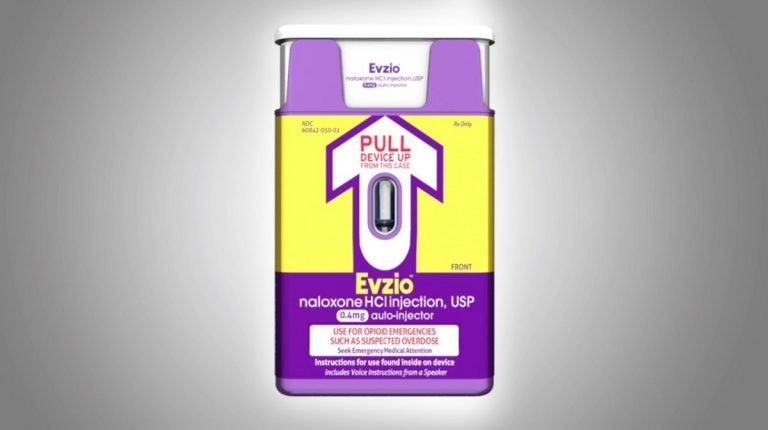Delaware school nurses to carry overdose-reversing drug naloxone

DelDHSS receives Naloxone donation (photo courtesy of DelDHSS)
Starting in September, nurses at Delaware’s public high schools will have access to naloxone, a drug that reverses the effects of an overdose.
Heroin and opioid related overdose deaths don’t discriminate between ages. Last year the youngest person in Delaware to die from an overdose was 15.
Starting in September, nurses at Delaware’s public high schools will have access to naloxone, a drug that reverses the effects of and overdose, in order to save young lives if an overdose occurs.
“In any public health epidemic, our first goal is to save as many lives as possible,” said Rita Landgraf, Delaware’s Secretary of Health, in a statement.
Legislation sponsored by Sen. Bethany-Hall Long, D-Middletown, allowing school nurses to carry naloxone passed in April.
After receiving a donation of 2,000 naloxone units, the Delaware Department of Health and Social Services is distributing the auto-injector kits called Evzio to the Department of Education, addiction treatment centers and participating police departments.
The donation was made by kaléo, a Richmond, Va. company that manufactures Evzio.
“Even people who take their opioid pain medications as prescribed can be at risk for an opioid emergency, such as an overdose,” said Spencer Williamson, CEO of kaléo, in a statement.
“On average, 44 people die each day from prescription opioid overdose alone, and more than 80 percent of those are unintentional. We are honored to support the State of Delaware’s efforts to equip citizens with naloxone and help save the lives of those who are experiencing an opioid emergency.”
DHSS and AtTAcK addiction, a grassroots advocacy group in Delaware, facilitated the donation in the wake of a growing number of overdose deaths.
In 2014, 185 people died from suspected overdoses in Delaware, or about one person every other day, according to the health department. Many of those overdoses were the result of heroin or prescription painkillers. Between January and July of this year there have been 78 suspected overdose deaths.
“Our hope is that the availability of Evzio and its ease of administering will break down perceived obstacles to departments of (police) officers carrying the medication,” said David Humes, a founding member of atTAcK addiction, in a statement.
“As a state, we need to continue to put the focus on saving lives and ending the epidemic of substance use disorder.”
In June, the National Association of School Nurses adopted a position paper supporting the use of naloxone in schools, citing the 2013 Partnership Attitude Tracking Study that states almost one in four American teens reported abusing or misusing a prescription drug at least once in their lifetimes, and one in six reported doing so within the past year.
Dr. Linda C. Wolfe, director of School Support Services in the Department of Education, said she’s unaware of any overdose deaths occurring in school, but that nurses should be prepared if an incident occurs.
“Given the rate of overdose and death in Delaware, we are supporting Public Health’s proactive outreach to community partners who work with vulnerable populations,” she said in a statement.
In 2014, Gov. Jack Markell, D-Delaware, signed two pieces of legislation expanding the use of naloxone among law enforcement and in the community.
Since then, about 300 community members have been trained to use naloxone, and three police departments–New Castle County, Middletown and Ocean View–have saved people from overdose.
Delaware paramedics have been carrying naloxone for several years. In 2014, they administered it 1,244 times, reviving 668 people, according to the Division of Public Health. The antidote also is used in emergency rooms.
“We know the availability of naloxone in emergency rooms, ambulances and police cars leads to hundreds of lives being saved and we are grateful to kaléo for their generous donation,” Markell said in a statement.
“With this donation, we will be able to reverse more overdoses and work with individuals to get them the treatment they need in order to live full, healthy lives.”
WHYY is your source for fact-based, in-depth journalism and information. As a nonprofit organization, we rely on financial support from readers like you. Please give today.





